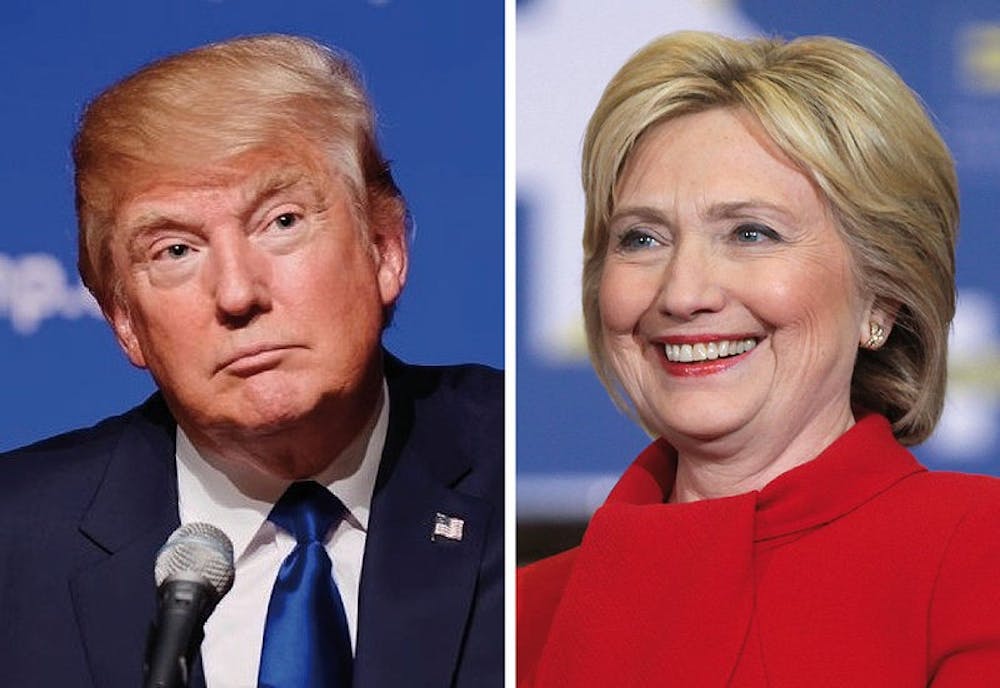With just nine weeks remaining until election day on Nov. 8, Democratic nominee Hillary Clinton has a comfortable edge in national polls although she continues to struggle with high unfavorability ratings.
Doubts linger about her character due to her use of a private email server for confidential emails and her meetings with major donors of the Clinton Foundation while she served as Secretary of State.
These issues have kept Clinton’s unfavorable numbers high. According to an Aug. 31 ABC News/Washington Post poll, she has an unfavorability rating of 59 percent. According to this poll, both Clinton and Republican nominee Donald Trump remain a largely distasteful choice for most voters, each facing high unfavorable ratings among registered voters.
Fresh off a series of controversial public comments over the summer, Trump has attempted to court minority voters. He faces a serious deficit against Clinton with minority voters. Trump seemed to be changing his tone following a meeting with Mexico’s President Enrique Peña Nieto on Sept. 1. However, he maintained his hard stance on immigration in a speech later that day, promising to build the border wall and opposing amnesty for illegal immigrants in the U.S.
Sophomore Camila Montejo, on behalf of the board of the Hopkins Latin student group OLÉ (Organización Latina Estudiantil), stated that Trump’s solutions are based on exaggerated fears of immigrants, and that rising anti-immigrant sentiment is partly to blame for the estimated 11 million undocumented people who live in the U.S.
“The reason that we have illegal immigration is because the system is not accessible to Mexicans and other immigrants and it is difficult to begin the naturalization process,” Montejo said. “It’s also the treatment of these immigrants once they get to this county. They are degraded in society, in the news, everywhere. It’s discouraging to even try to put themselves out there to become citizens.”
OLÉ said they support easing the naturalization process for immigrants, and that despite Trump’s numerous claims about deportation and a border wall, conditions in their home countries are the primary concern for Hispanic immigrants.
Montejo thought that Trump’s meeting with Peña Nieto was a pretension.
“Immigration laws should be in place because there are economic and political reasons for them, but that they should be more accessible, especially for South American immigrants,” Montejo said. “I believe that the claims that immigrants take jobs, commit crimes are blown out of scale.”
In local Maryland politics, one of the state’s two seats in the Senate is being sought by Republican Kathy Szeliga, Democrat Chris Van Hollen and Green Party candidate Margaret Flowers.
Szeliga, a Baltimore native, graduated from Towson University at the age of 32 and became the highest-ranking Republican woman of the Maryland legislature. She has also taught at Baltimore’s public schools. While Van Hollen is regarded as the more experienced candidate, Szeliga has said that she will bring “business sense” to Washington. No recent polls have been conducted, but Maryland is a reliably blue state.
In the mayoral race, Democratic nominee Catherine Pugh overcame her biggest challenge for mayoral office in the April 26 primary. She narrowly beat challenger and former Baltimore mayor Sheila Dixon. Pugh is widely expected to win in Baltimore. A Republican has not won in Baltimore since 1967. She has raised $280,000 for her campaign according to public campaign records, nearly 100 times the amount held by Republican opponent Alan Walden.
Raising the minimum wage in Baltimore to $15 an hour by 2022 is among the major issues this year. The current minimum wage is $8.75 an hour. Walden opposes the policy on the grounds that it will harm businesses and decrease jobs. However, the City Council is considering an exemption for small businesses. Pugh has not taken a position on the issue. The bill will go before the City Council following the November election.
Maryland residents have until Oct. 18 to register to vote either in person or through Maryland’s Online Voter Registration System.





